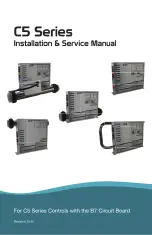
User’s Manual
47
4. S
OFTWARE
Dynamic C is an integrated development system for writing
embedded software. It runs on an IBM-compatible PC and is
designed for use with single-board computers and other devices
based on the Rabbit microprocessor.
Chapter 4 provides the libraries, function calls, and sample pro-
grams related to the OP7200.
4.1 Running Dynamic C
You have a choice of doing your software development in the flash memory or in the static
RAM included on the OP7200. The flash memory and SRAM options are selected with
the
Options > Compiler
menu.
The advantage of working in RAM is to save wear on the flash memory, which is limited
to about 100,000 write cycles. The disadvantage is that the code and data might not both
fit in RAM.
NOTE:
An application can be developed in RAM, but cannot run standalone from RAM
after the programming cable is disconnected. Standalone applications can only run from
flash memory.
NOTE:
Do not depend on the flash memory sector size or type. Due to the volatility of
the flash memory market, the OP7200 and Dynamic C were designed to accommodate
flash devices with various sector sizes.
OP7200s that are special-ordered with 512K flash/512K SRAM memory options have two
256K flash memories. By default, Dynamic C will use only the first flash memory for pro-
gram code in these OP7200s. Uncomment the
USE_2NDFLASH_CODE
macro within the
RABBITBIOS.C
file in the Dynamic C
BIOS
folder to allow the second flash memory to
hold any program code that is in excess of the available memory in the first flash.
Summary of Contents for eDisplay OP7200
Page 1: ...eDisplay OP7200 VGA Operator Control Panel User s Manual 019 0116 060831 J...
Page 6: ...eDisplay OP7200...
Page 14: ...8 eDisplay OP7200...
Page 22: ...16 eDisplay OP7200...
Page 52: ...46 eDisplay OP7200...
Page 126: ...120 eDisplay OP7200...
Page 132: ...126 eDisplay OP7200...
Page 152: ...146 eDisplay OP7200...
Page 168: ...162 eDisplay OP7200...
Page 172: ...166 eDisplay OP7200...
Page 174: ......
















































